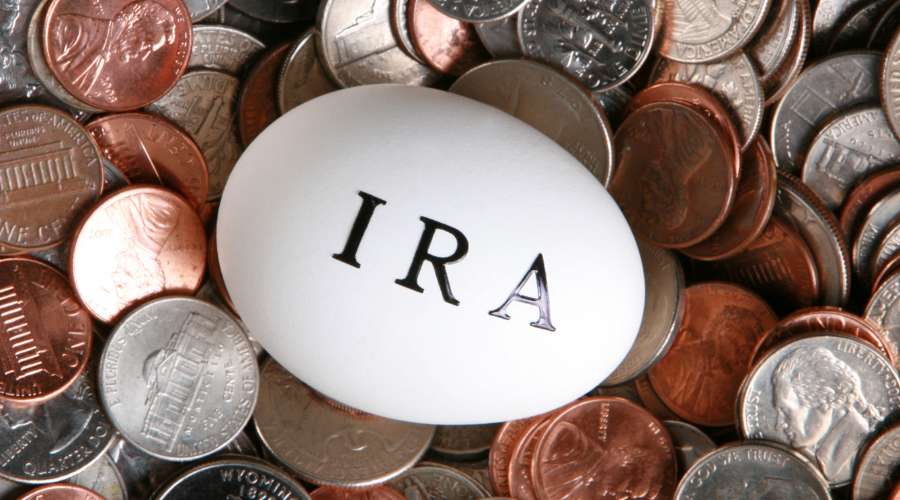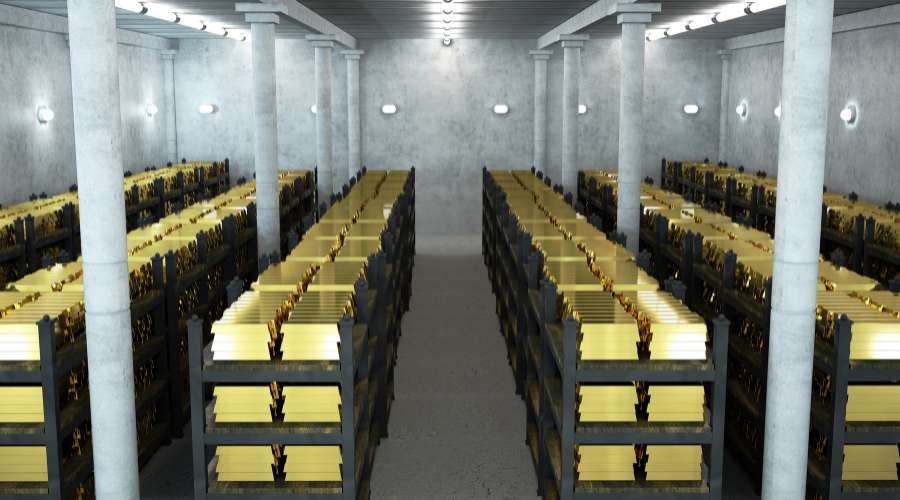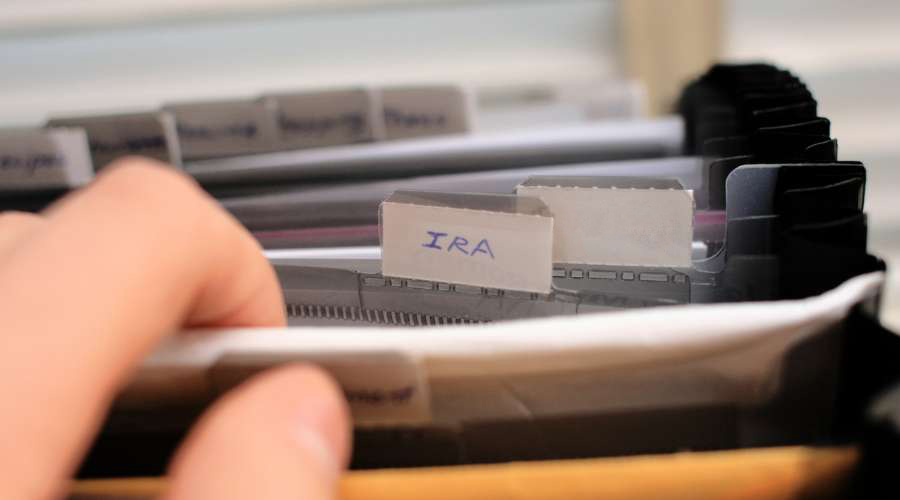It's no secret that the investment world can be a wild ride. The volatility of the international financial market affects every asset class, from equities to cryptocurrencies; one day the Dow Jones is soaring and the next it is plunging because of a pandemic or other catastrophic occurrence.
Gold, silver and other precious metals, however, have not only survived but thrived, despite the ebb and flow of the global economy. Unlike bonds, stocks and mutual funds, gold and silver increase in value when the stock market declines, making them excellent long-term investments, especially for retirees.
Gold-based individual retirement accounts (IRAs) may be one of the finest ways to safeguard retirement assets from inflation and market volatility in today's uncertain market.
If you're considering opening a precious metals IRA, it's important to understand that many fees are associated with doing so. Due to the tax-deferred nature of Gold IRAs, they must be held in a third-party depository and managed by a qualified IRA administrator or custodian approved by the IRS.
This article will provide an overview of the costs involved, from setting up the account to managing and maintaining it over time. You will also learn about the potential tax benefits of investing in a gold IRA.
If you are interested in investing, make sure to take a look at our highest recommended companies for this year!
>> Click Here For A List Of The 5 Highest Recommended Precious Metals Investment Companies <<
What Is a Gold IRA?

A gold IRA is a way to invest in gold using a self-directed Individual Retirement Account (IRA). It allows you to diversify your retirement portfolio with physical gold and other precious metals. With a Gold IRA, you can buy and store gold coins, bars and rounds in a secure depository.
The gold is held in a custodian account on your behalf and you have the option of taking physical possession of your gold at any time.
With a self-directed Gold IRA, you can choose which investments you want to make. You can choose from gold, silver, platinum and palladium coins and bars, as well as other precious metals.
You can also invest in mutual and exchange-traded funds (ETFs) that focus on the gold and precious metals markets. You can even use the funds from your gold IRA to invest in stocks and bonds. With a self-directed IRA, you have complete control over your investments, making it a great way to diversify your retirement savings.
Types of Gold IRA Accounts
When it comes to investing in gold, there are three main types of gold IRA accounts: Traditional gold IRA, Roth gold IRA and SEP gold IRA. Let's take a look at each in detail so you can decide which is the best for you and your financial goals.
Traditional Gold IRA
With this type of account, you can purchase and store physical gold in a tax-advantaged retirement account. Your contributions to the account are tax-deductible and your investments will grow tax-free until you make withdrawals in your retirement years. This makes it an excellent option for those who want to maximize their retirement savings.
Roth Gold IRA
A Roth gold IRA is another type of gold IRA that is funded with post-tax dollars. With this type of gold IRA, you receive no immediate tax benefits when you make contributions, but you can benefit from tax-free withdrawals in retirement.
You can use funds from a Roth gold IRA to purchase gold coins, bars or rounds, which are held in a custodial account in your name. When the time comes to distribute funds, the gold is sold and the proceeds are paid out tax-free.
SEP Gold IRA
This type of account is designed for self-employed individuals and small business owners. It allows you to contribute up to 25% of your income and your contributions are tax-free. This makes it a great way to save for retirement without worrying about taxes.
Costs Associated with a Gold IRA

To understand the costs associated with this type of investment, it's important to look at the fees involved.
Account Set Up Fees
The good news is that converting an existing traditional IRA into a precious metals IRA does not incur any rollover or transfer fees mandated by the government. That is not to say there aren't any costs associated with opening an account.
To initiate the account opening procedure for these self-directed IRAs, precious metals IRAs typically incur a processing fee from their approved custodians and administrators. The good news is that most of these costs are one-time only. The average cost of this type of administration is around $50, though this varies widely from administrator to administrator.
Fortunately, many providers offer discounts or waive these fees if you meet certain requirements. It's important to check with your provider to determine if they offer any promotions or discounts to help you save money.
Commissions and Markups on Coins
When using a self-directed IRA to buy precious metals, there are multiple commissions to consider. Any purchases or sales of physical coins or bars will incur the standard transaction costs. Such charges are generally made per transaction.
The more frequently you trade, the more often you'll have to fork over cash to cover these costs. In addition, it doesn't matter whose administrator you go with; you'll still have to pay a transaction fee (called a "commission").
They are simply passing on charges levied by the bullion or coin dealer with whom they transact business on your behalf. Varying administrators will charge different fees, but $40 per transaction is a decent ballpark figure.
Please remember that coin dealers will also impose a markup over the spot in addition to these fees. You will pay a premium above the spot price for the precious metals and the value of the gold, silver, platinum or palladium contained within the coins or bars you purchase. This ranges from situation to situation, product to product and dealer to dealer.
Maintenance Fees
An eternal payment of the initial application and setup fee for your precious metals IRA would leave your account administrator in financial ruin. You'll also have to pay a yearly account maintenance fee to keep your account open, process your statements and keep track of your investments.
Standard annual fees for account maintenance cost anywhere from $75 to several hundred dollars. Look for the annual fee disclosure when you receive your free information kit or account setup paperwork. They must be specified in writing.
If your account is extensive, some administrators may offer you a reduction on the annual price after the first year. Be wary of companies that charge you a fee that varies according to the value of your metal holdings in the account. These charges grow in proportion to the amount and value of your gold holdings and they can quickly become unaffordable if you're not careful.
Storage Fees

The vaulting depository will charge you fees for storing and maintaining your collection of precious metals. Gold, silver, platinum and palladium stored in these accounts must be kept in a secure, off-site location managed by a third party that is not the account administrator, as required by the Internal Revenue Service (IRS).
Brinks and Delaware Depository are two examples of depositories that charge annual fees to cover these expenses. Your administrator passes them to you. In the end, the fees will be determined by your chosen depository.
Depending on the monetary value of the precious metals in question, these companies often charge anywhere from half a percent to one percent per year. The rates may vary depending on whether you opt for shared, aggregated storage or private, segregated storage for your precious metals.
Miscellaneous Fees
Miscellaneous fees, such as those associated with wire transfers, are also often inevitable. Most IRA custodians charge these costs whether you ask them to transmit money directly to you or when they're asked to wire money to a third party (such as a coin/bullion dealer or depository). For each outbound wire transfer they process on your behalf, you should expect to pay roughly $25 in fees. Account opening papers should equally include a clear explanation of these charges.
Liability Insurance
Because precious metals secure the account, liability insurance must be purchased to safeguard the investment. This is typically included in storage costs, increasing the annual average to around $300.
Termination Fee
When you close out or terminate your gold IRA, a termination fee is charged. This fee is typically paid to the custodian of the IRA to cover administrative costs associated with the termination. The amount for this fee can vary from custodian to custodian, so it's important to shop around to find the best deal.
This fee can range from around $50-$150 depending on the custodian and the amount of assets in the account. It's important to know that these fees are typically non-refundable, so make sure you understand the terms and conditions of your IRA before initiating the closure process.
Benefits of Investing in a Gold IRA
Gold IRAs are self-directed IRAs, which means you can choose the specific gold and other precious metals you want to add to your portfolio. Here are some of the key benefits of investing in a gold IRA.
Diversification
Investing in a Gold IRA can help you do just that. Gold has proven to be one of the most reliable investments, as its value remains relatively stable during economic downturns and inflationary periods.
Investing in a gold IRA can spread your investments across various asset classes, reducing your exposure to market volatility and helping ensure your financial future is secure.
Inflation Hedge
Gold has been a reliable asset for centuries, known for maintaining its purchasing power even when other investments are losing their value. Gold has the potential to increase in value when the economy is experiencing inflation, which makes it a great hedge against rising prices. When you invest in a Gold IRA, you can rest assured that your retirement savings will be safe in case of inflation.
Liquidity
A Gold IRA allows you to easily access your investments without waiting for the standard withdrawal process associated with other IRAs. Since Gold IRAs are backed by physical gold, you can liquidate your assets quickly if needed.
This gives you the flexibility to adjust your investments according to the changing economic conditions, so you can be sure that your retirement savings are secure.
Store of Value
Gold has been used for centuries and is a safe option for safeguarding your financial future. Gold is a finite resource, meaning its supply is limited, meaning its value is unlikely to depreciate significantly. In addition, gold typically holds its value better than other investments during economic uncertainty and market instability.
Tax Advantage
By investing in a Gold IRA, you can save on taxes because you can defer or avoid paying taxes on any profits when you withdraw the funds. You can also benefit from the tax-sheltered status of your gold IRA account, allowing you to grow your retirement savings faster.
With a Gold IRA, you can also take advantage of any tax deductions related to your account, such as contributions to eligible expenses.
Hedge Against Market Crashes
Gold has been known to be one of the most reliable investments during turbulent times, as its value doesn't decrease with the stock market. This means that if the stock market crashes, the value of your gold won't be affected - giving you peace of mind and financial security. Additionally, gold is a tangible asset, meaning it's not subject to the whims of the stock market. Furthermore, gold is a universal form of currency, so you can use it to purchase goods and services in any country around the world.
Setting Up a Gold IRA

As with any investment, there are several steps involved. But don't worry! It's not too complicated—follow this guide and you'll be ready to invest in no time.
1. Choose a Custodian for your Gold IRA
The custodian holds the gold in your account, so selecting a reputable and reliable one is important. Make sure to research the company's reputation and track record before deciding.
2. Open Your Account
This is when you decide what type of IRA you want (traditional or Roth) and provide the custodian with all the necessary information, such as your name, address, Social Security number and driver's license.
3. Fund Your Account
Funding your gold IRA account is quite simple! You can either fund it with a rollover from an existing retirement account or through a direct cash transfer. To do a rollover, you must contact the custodian of your current retirement account and fill out the necessary paperwork to transfer assets into your gold IRA.
If you're transferring cash, you'll need to provide your IRA custodian with the details of your financial institution and the amount you wish to transfer. They will then initiate the transfer for you. It's important to note that the IRS limits the amount of money you can contribute to a gold IRA each year, so check with your custodian for the current contribution limit.
4. Purchase Your Gold
You can purchase gold coins, bars, rounds and other forms of physical gold. Your custodian will guide you on what types of gold are allowed in your IRA. It's important to remember that the gold must be stored in an approved depository designated by the custodian.
5. Monitor Your Investment
You'll want to review your account statements regularly to ensure that your gold investments perform as expected. Additionally, you'll need to ensure that your custodian appropriately accounts for deposits and withdrawals and that your investments are properly allocated.
Final Thoughts
The cost of investing in a gold IRA will vary depending on the type of product you purchase, the amount you invest and the company you use. Generally speaking, a gold IRA will cost anywhere from 0.5%-3% of the total investment. This cost can cover fees for setting up and managing the account, storage and insurance expenses.
At first glance, this may seem like a lot of money, but the benefits of owning a gold IRA far outweigh the costs. With gold prices continuing to rise, a gold IRA can be a great way to diversify and protect your retirement portfolio. Gold is an inflation-proof asset, meaning its value will remain consistent regardless of economic conditions.
If you're considering investing in a gold IRA, we highly recommend using one of our recommended companies. They offer competitive rates, outstanding customer service and reliable storage solutions – all at a fraction of the cost of other companies. Their knowledgeable staff can help answer any questions about investing in a gold IRA.
Don't forget to check out our top recommended companies before investing!
